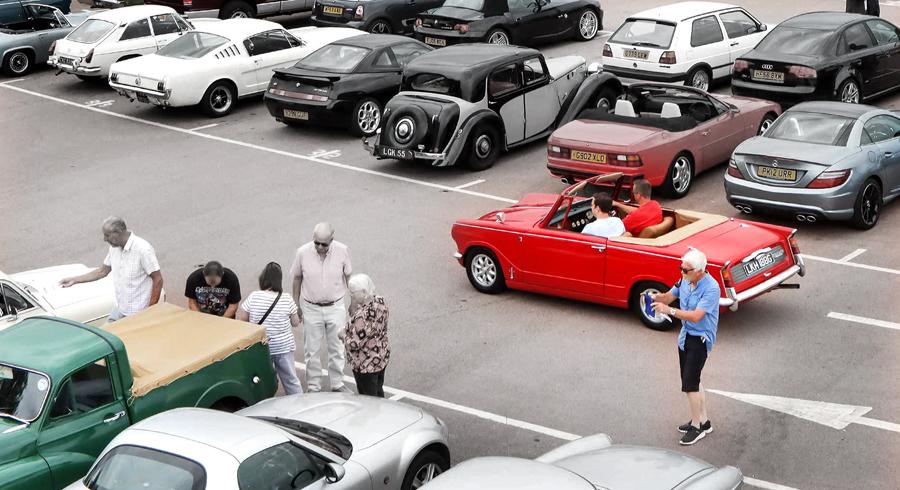FBHVC calls for “pragmatic and constructive” historic vehicle registration regime

Published: 04/07/2024
The Federation of British Historic Vehicle Clubs (FBHVC) is calling on the new Secretary of State for Transport – and the DVLA for which they will be responsible – to work with it to achieve, a “pragmatic and constructive” historic vehicle registration regime.
The DVLA is responsible for vehicle registration and licensing on behalf of the Transport Secretary, having taken over the responsibility from local authorities from 1973.
The FBHVC move follows its submission yesterday to the government’s ‘Call for Evidence’ (CFE) into the DVLA. Unveiled by previous Transport Secretary Mark Harper, in a visit to Bicester Heritage on 9 May, the CFE asks 46 questions about the present system and responses had to be made by 4 July 2024.
The last three years have seen the FBHVC working hard to overcome a range of difficulties being faced by historic vehicle owners with the DVLA concerning vehicle registration.
Extensive dialogue with the DfT and DVLA, has drawn attention to the current challenges and inconsistencies surrounding the historic vehicle community’s interaction with their policies.
Last year, the FBHVC was invited to take part in a formal Cabinet Office review into the DVLA, which saw the Federation submit many pages of evidence covering the extensive issues and problems, now addressed in the CFE.
Representing more than 250,000 historic vehicle enthusiasts, from its 500 affiliated clubs, 50 museums plus individual and trade supporters, the FBHVC says the CFE was “extremely positive and very welcome”.
However, its detailed examination found the CFE to be “less than entirely clear in providing background information for all of the questions it poses.” And, the FBHVC was concerned that respondents, “particularly those who may not deal with historic vehicle registration matters and DVLA on a regular basis, may not fully appreciate the significance.”
To address this and to ensure that members’ views were correctly represented, a simplified survey based on the CFE was constructed and circulated by the FBHVC to all its clubs, museums and supporters.
The survey proposed a FBHVC response to each question and requested indication of agreement or otherwise, with a free-text box for comments.
In total 4,485 responses to the survey were received, with 81.2% agreeing in full with the FBHVC’s proposed responses.
Of the rest, the majority were concerned with three main subject areas (kit cars and conversions, historic & classic vehicles and special treatments, vehicles converted to electric), with each topic attracting responses from 254 to 287 people (7% of the total surveyed).
All comments were assessed by the FBHVC team and, where possible, were incorporated into the formal FBHVC response to the CFE.
Responding to the Government’s call for ideas and suggestions to improve the system, the FBHVC says it “would like to see, and is willing to work with the DVLA to achieve, a pragmatic and constructive registration regime” that:
- Actively seeks to find ways in which a genuine but problematic historic vehicle can be registered as such whilst seeking to exclude the non-genuine
- Is open to accepting judgement decisions rather than a systemised yes/no approach
- Is open to seeking and accepting advice from external sources
- Recognises that historic vehicles are by definition old and that components unavoidably degrade over time with use, damage, corrosion etc
- Recognises that the supply of original parts is constantly diminishing and that as a result the repair of parts and use of more recently manufactured parts is unavoidable and does not necessarily diminish the historic status of the vehicle.
- Recognises that the motor industry has changed out of all recognition and that the continuance of a manufacturer name does not necessarily refer to the same company.
Also calling for the DVLA to set up independent advisory groups, the FBHVC is clear about the role clubs should play in the future.
“Specialist clubs have considerable knowledge and attempts should be made to utilise this” it says.
“FBHVC can and is prepared to provide a co-ordinating and guiding function. The current V765 or Reconstructed Classic schemes could provide a procedural template for club involvement.”
To read the full FBHVC response visit: https://www.fbhvc.co.uk/consultations
The next issue of HISTORIC the FBHVC magazine (sent to all members) will have a special article explaining the how the response was formulated. You can join the FBHVC here from only £20 https://www.fbhvc.co.uk/join-and-renew










